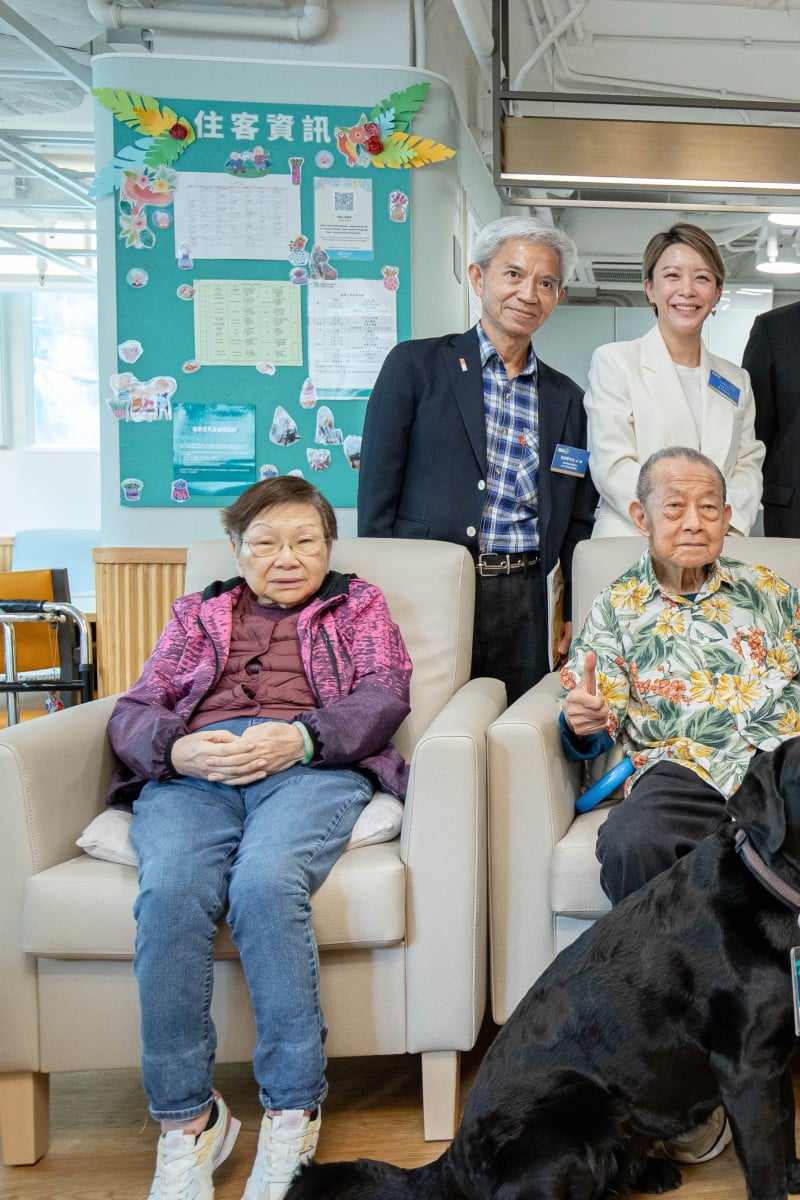
- Canines who fail to qualify as guide dogs with Hong Kong Seeing Eye Dog Services are being deployed to live in care facilities, bringing cheer to residents
- Secretary for Labour and Welfare Chris Sun said that while the government has introduced measures to improve senior well-being, nothing compares to real companions like dogs
 Fruity the dog at the elderly facility in Tuen Mun where she lives, along with (second from lower left) Johnson Ho, resident of the home; (third from lower left) Secretary for Labour and Welfare Chris Sun, and (third from upper right) David Cheung, CEO of HKSEDS. Photo: Handout
Fruity the dog at the elderly facility in Tuen Mun where she lives, along with (second from lower left) Johnson Ho, resident of the home; (third from lower left) Secretary for Labour and Welfare Chris Sun, and (third from upper right) David Cheung, CEO of HKSEDS. Photo: Handout
In a quiet elderly home in Tuen Mun, a furry resident donning a red badge and uniform accompanies seniors on their morning exercises and afternoon outings.
The five-year-old Labrador, Fruity, has spent the last four months at the Forward Living community centre under the Companion Dog Service Programme from Hong Kong Seeing Eye Dog Services (HKSEDS).
As the city’s first companion dog to reside in an elderly care facility, Fruity’s presence has infused joy into the lives of its 60 residents.
“Before Fruity arrived, I spent most of my time alone in my room watching television,” recalled Johnson Ho, an 83-year-old resident of the elderly home for four years.
“But now, I often take Fruity outdoors to play fetch, and we both have a blast during the activities. When Fruity gets tired, I take her for a leisurely walk in the park to rest.”
Fruity’s presence has also fostered stronger bonds among the centre’s residents. “Fruity has provided us with a shared topic of conversation, and we enjoy training her together, teaching her tricks like shaking hands. It brings us immense joy and laughter,” Ho said.
Ho and other mobile residents take Fruity to visit other floors to uplift bedridden people. “Dogs are intelligent creatures, and they love being with humans,” Ho said. “For those lying in bed feeling bored, simply patting Fruity’s head and ears brings them happiness. It makes them feel like they are living a joyful and dignified life.”
Exceptional, affectionate dogs
Launched last year, HKSEDS’s companion dog programme has sent emotional support dogs to more than 20 organisations and schools. There are currently six companion dogs in service, and over 5,000 people have benefited from the programme so far.
In response to the growing demand for elderly care services, the NGO expanded its programme by deploying Hong Kong’s first companion dog to an elderly home last December.
“As an organisation that specialises in guide dogs for the visually impaired, we possess many exceptional dogs, some of which may not meet the criteria to become guide dogs. So, we thought, why not repurpose them as companions to help more people in need?” said David Cheung, CEO of HKSEDS.
He explained that only half of the candidates for guide dogs can meet the rigorous criteria. However, many are friendly and reliable, making them well-suited for companion roles.
“They all come from a lineage of guide dogs with genes that promote non-aggressive behaviour and have consistently showed excellent temperament over generations, with no records of biting people,” Cheung noted.
“For example, Fruity is a delightful and affectionate dog who enjoys interacting with people and shows no fear of strangers.”
Hong Kong school’s cat shelter gives students space to take a break from studies, play with kittens
Cheung said the training process for companion dogs varies slightly from that of guide dogs. While guide dogs are trained to assist blind people without any interference, companion dogs are encouraged to be comfortable with being hugged, cuddled, and petted by anyone.
“We were surprised by the positive impact on the well-being of the elderly. Some who usually remain quiet in their wheelchairs come alive when they see the dogs. Their eyes light up, and they become more talkative. Witnessing such transformations is truly touching,” Cheung remarked.
High demand for companions
The NGO has received numerous inquiries from elderly care institutions interested in companion dog services. However, many of these facilities find it challenging to afford the service and meet its requirements.
“We send our staff to assess the living conditions of the centres to ensure that the environment would not cause the dogs to feel depressed,” explained Cheung. “We also evaluate if the institutions have sufficient manpower to take care of the dogs and if the staff are comfortable with interacting with animals.”
He added that institutions unable to meet the requirements could receive regular visits from the dogs instead.
The NGO provides elderly home staff with at least 30 hours of training when they place a companion dog in a care centre. This training teaches them how to read the dog’s body language and handle its daily needs. Additionally, their trainers visit the centre at least once a month to assess the dog’s condition.
Chris Sun, Secretary for Labour and Welfare, acknowledged the significant contributions companion dogs can make in enhancing the quality of life for the elderly.
“Loneliness is one of the biggest challenges faced by the elderly today,” Sun said.
“We have introduced various measures to address the emotional needs of the elderly, such as setting up hotlines or utilising technology with companion robots. However, no matter how advanced AI technology becomes, it cannot compare to the emotional support provided by real companions like Fruity,” he said.
Could AI-powered mental health apps and platforms help Hongkongers?
Sun expressed hope that the service could be expanded to benefit individuals with disabilities, children, and others in need.
Recognising the significant need for the programme, Cheung shared the organisation’s plans to train more companion dogs. However, making the service sustainable in the long run requires help from the public.
“There is a surge in demand, and we have such a great programme that is already a common practice in foreign countries. I hope people can help brainstorm ways to promote this service on a larger scale,” Cheung said.
